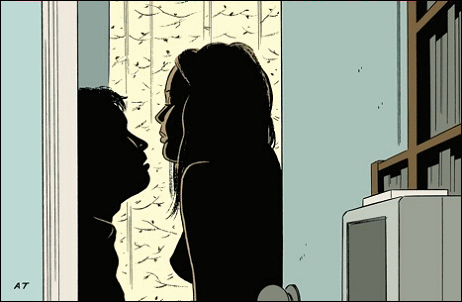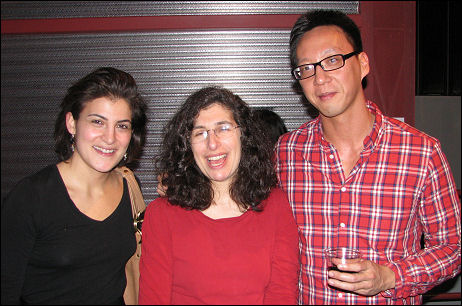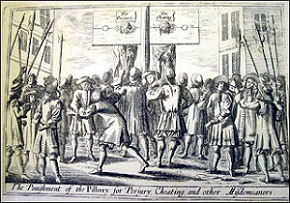“Steve Carell‘s next film would appear to be definitely Date Night with Tina Fey,” a guy I know confides. “Their respective windows on both their series necessitates it.” One look at this and it seems to be primarily about the pairing of names, and secondarily about Josh Klausner‘s script. (His last two gigs were the third and fourth Shrek films.) The other concern is that it’s being directed by Shawn Levy, which means a certain been-there-eighteen-times-before quality.
Day: March 9, 2009
Talkies
“You’re about twenty-five years old, and you’re no more than, shall we say, intermittently employed, so you spend a great deal of time talking with friends about trivial things or about love affairs that ended or never quite happened; and sometimes, if you’re lucky, you fall into bed, or almost fall into bed and just enjoy the flirtation, with someone in the group.

“This chatty sitting around, with sex occasionally added, is not the sole subject of ‘mumblecore,’ a recent genre of micro-budget independent movies, but it’s a dominant one. Mumblecore movies are made by buddies, casual and serious lovers, and networks of friends, and they’re about college-educated men and women who aren’t driven by ideas or by passions or even by a desire to make their way in the world.
“Neither rebels nor bohemians, they remain stuck in a limbo of semi-genteel, moderately hip poverty, though some of the films end with a lurch into the working world.
“The actors (almost always nonprofessionals) rarely say what they mean; a lot of the time, they don’t know what they mean. The movies tell stories but they’re also a kind of lyrical documentary of American stasis and inarticulateness.” — New Yorker critic David Denby in an essay about “this low-key but cheering [cinematic] movement” in the current issue.
“You Lied To Me!”
“In finding his voice as a comedy director with the making of Bringing Up Baby, Howard Hawks set up archetypes of theme and performance that are still valid,” writes New Yorker Richard Brody. His article is a nod to MOMA screenings of this 1938 classic from 3.11 to 3.13.
“He turned Cary Grant into an extension of his own intellectual irony, an absent-minded professor who seems lost in thought but awaits the chance to unleash his inner leopard. He reinvented Katharine Hepburn as a sexually determined woman who hides her aggression under intricate scatterbrained schemes that entrap the deep thinker in adventures that reveal his untapped humor and virility. And he brought to fruition his own universe of hints and symbols for the force that rules the world: she tears his coat, he tears her dress, she steals his clothes, she names him ‘Bone’ and the mating cries of wild animals disturb the decorum of the dinner table, even as a Freudian psychiatrist in a swanky bar gives viewers a skeleton key in advance.”
BAM Moment
(l. to r.) Tribeca Film Festival’s Genna Terranova, 42 West partner Cynthia Swartz and IFC Films honcho Ryan Werner at last night’s party for a “Focus on IFC Films” program at the Brooklyn Academy of Music (3.6 to 3.12).

Guttural Sandpaper Thing
Speaking as a former stage actor (seriously — I acted in two plays in the mid ’70s), it feels good and creates a sense fo comfort to be able to project in a raspy voice if you can summon one that sounds right. Because raspy is a macho bit that keeps the audience from peering into your inner child.
Oh, Come On…
History will always regard the finest Movieline era as the one that transpired in the late ’80s and ’90s with that very knowing, vaguely snooty and dismissive, sell-that-horseshit-somewhere-else incarnation that came to pass under editor Edward Margulies and editor-contributors Virginia Campbell, Stephen Rebello, Martha Frankel and Josh Mooney.
Suffice that the late-Bush ’41 and Clinton-era Movieline cut things down. Yeah! And that Margulies & Co. would have choked on the idea of writing “unabashedly” about love for all things Hollywood, which is what the next generation of Movieline guys — Defamer‘s Seth Abramovitch, S. T. VanAirsdale and Kyle Buchanan — are claiming they want to do when the online version launches “in the spring,” according to a N.Y. Times story that ran today.
I thought I knew the Defamer guys. They are not and never have been Hollywood cuddle bunnies and ass-kissers. The Times piece, written by Stephanie Clifford, says that “while Abramovitch says he plans to keep some satirical elements, [his] plans for Movieline make it sound like it may soon be a target for sarcasm on Defamer.” Let me put as plainly as Richard Burton‘s Thomas Becket put it to Peter O’Toole‘s Henry II after learning of his plan to make Becket the next Archbishop of Canterbury. “I beg of you,” Becket said to his king. “Do not do this.”
“Meta Quality”
Duplicity director-writer Tony Gilroy “loves puzzles,” writes New Yorker profiler D.T. Max, “and Michael Clayton was full of them. So is Duplicity (3.20), with its scheming, warily passionate spies.
“‘If I told you I loved you, would it make any difference?’ Claire (Julia Roberts) asks Ray (Clive Owen) at one point. ‘If you told me or if I believed you?’ Ray responds. Gilroy calls the film ‘counterprogramming — not the normal thing to do next.’ It is fast, lighthearted, and intense. Even though, as Gilroy explains, ‘Michael Clayton could have been a novel [but]Duplicity could only exist as a movie.”
“Yet it, too, is out of step with current Hollywood practice,” Max observes. “It is a thriller shot almost entirely indoors. Ray and Claire do not career through Rome in a Porsche. There are no police cruisers piling up behind them at the end. Their passion is communicated largely with faces, not bodies.
“The engine of Duplicity is the question of who is tricking whom — and, thus, where reality lies. The movie has an array of flashbacks that scramble the time frame, a complication that almost prevented the film from being made. Steven Spielberg, who, at one point, was interested in directing it, with Tom Cruise in the Owen role, was so confused by the plot that he organized a table reading in his office at DreamWorks to clarify who did what to whom. Later, he jokingly suggested that the DVD include, as a bonus track, a chronological run-through of the story. (Ultimately, he dropped out.)
“The core of Duplicity is the screenwriting trope known as the reversal. Gilroy told me, ‘A reversal is just anything that’s a surprise. It’s a way of keeping the audience interested.” A camera follows a man as he goes up the stairs to an apartment; we see his wedding ring as he pulls out his keys. He pushes open the door, slowly — a husband coming home, trudging up the stairs with his briefcase. But a woman in black lingerie greets him: he’s seeing his mistress! That is a reversal. In Good Will Hunting, when Matt Damon, mopping the floor at a university, comes upon a complicated math problem on a blackboard and solves it, the audience suddenly realizes that he is not an ordinary janitor — that’s a reversal, too.
“Duplicity is so crammed with reversals that Stephen Schiff, a screenwriter who is a friend of Gilroy’s, says that the story ‘achieves a kind of meta quality.'”
All I can say is, I’m very glad I have a copy of the script in my script folder. I’m going to read it over sometime between now and the N.Y. premiere, and when I see Duplicity a second time I’m going to be with it all the more. (Not to say I wasn’t with it the first time, but it made me feel a little dumb.) Which I’m very much looking forward to.
Way To Go
I heard an idea for a Hurt Locker copy line, something that’s close to or sounds like “the world’s hardest job” — the job being a bomb defuser in Iraq. Except that’s not it. At all. Jeremy Renner‘s Sgt. James character doesn’t see defusing bombs as satisfying because of the difficulty factor — he loves it because it puts him right next to death, and every time he successfuly defuses it gives him an “adrenaline fix” (a term used by Brian Geraghty‘s character) like nothing else.
The line Summit’s marketers need to be thinking of, then, is a line spoken by Ben Kingsley‘s Don Logan character in Sexy Beast, to wit: “It’s the charge, it’s the bolt, it’s the buzz.”
That, trust me, is the essence of it all. It’s not just what Renner’s character is looking for and running on, but what the movie and the audience are running on while watching it. The Hurt Locker isn’t a tragedy about a young soldier who can’t do anything but risk his life with IEDs, boo-hoo. It’s about breaking through that assumption about Renner being tragic and coming to see that while there is obvious sadness in being cut of from the warmer currents, he’s a great warrior possessed of true nobility. And that calling is what it is.
Gabriel’s Trumpet
In February’s Conde Nast Portfolio Amy Wallace wrote about last year’s decision by 20th Century Fox to rewrite Stephen Schiff‘s Money Never Sleeps, an allegedly sturdy Wall Street sequel with Michael Douglas again playing Gordon “greed is good” Gekko. Stephen Frears (The Queen) wanted to direct Schiff’s script and everything looked good.
But after last fall’s financial collapse Fox decided Schiff’s script “suddenly felt out of touch,” according to production co-prexy Alex Young, so they hired another writer, Allan Loeb (21), to make it more reflective of today’s meltdown vibe. Frears was no longer interested, but Wallace reports that Sleeps will roll sometime in the spring for release later this year. Why don’t I believe that?
Nor do I believe that Martin Scorsese will ever direct The Wolf of Wall Street, a drama about Wall Street skunk Jordan Belfort that Terence Winter has written drafts of.
Why? Because people don’t want to pay good money to see slick scoundrels revel in ill-gotten gains. The mood out there is clearly one of anger and revulsion at all the wheeler-dealers who got us into this mess. I therefore suspect that any portrayal of greedy thievery among young or middle-aged hotshots (a la Wall Street and Boiler Room) would be die of loneliness. Because the zeitgeist has reconstituted and the New Puritanism is upon us.
What might work, in terms of addressing the current anger and panic, is some kind of remake of Gregory La Cava‘s Gabriel Over The White House (1933). Some Came Running‘s Glenn Kenny reminded me of this morning, and the more I think about it the more here-and-now it sounds.
The story, based upon a book by Thomas Tweed and clearly focused on the crisis posed by the Great Depression, is a fascinating reflection of our current crisis. Just go to 1:20 in a speech given by President Judson Hammond (Walter Huston) and listen for a couple of minutes. The totalitarian powers that Hammond demands reflect what the Limbaugh crazies are afraid could happen today, and what some of us feel may be the only way out of the current malaise. We’ve got to get mad and forceful and slap down the righties and straighten this country out….or else.
The story is about Hammond, a fairly thoughtless and corrupt go-along politician upon his election, having a kind of religious revelation after getting into a car accident early in his term. A vision of the angel Gabriel comes to him and tells him to radically change tactics and proclaim himself a dictator in order to save the country from business-as-usual meandering. Describing himself as a kind of Jeffersonian fascist, Hammond comes off as an earnest and conscientious President who tackles unemployment, crime and the economy in the manner of of take-charge Abraham Lincoln. And then once Hammond has fulfilled his agenda and set the country on the road to recovery, he dies.
I spit on the idea of another bullshit Wall Street saga about bad guys in $2000 suits getting away with it until they don’t. But some kind of variation of Gabriel Over The White House….that speaks to me. It could connect if done right.
Get Those Guys
“I was watching Rush Limbaugh the other night, and I was horrified. I would have Rush Limbaugh drawn and quartered. He was sticking up for these Wall Street pigs. [I think] there should be public show trials, mass denunciations and executions.” — director-screenwriter John Milius, renowned for his conservative political views, speaking to CNN’s Thom Patterson.


John Milius; medieval stocks and pillories
Milius has rarely been more right-on. I’m saying this because I said more or less the same thing in early January, calling not for mass executions but recommending that the Wall Street & Washington scum who led and deceived us into this abyss need to be publicly humiliated. People took this as a joke, but it wasn’t and it’s not. I mentioned this idea at a party last night to a smart guy who knows the financial ropes, and he chuckled. Only guys like Milius seem to understand the rightness of such a move.
“Taxes are going to have to go up and entitlement programs are going to have to scalpeled down,” I wrote. “And ‘if we do nothing,’ Barack Obama has told the N.Y. Times, ‘then we will continue to see red ink as far as the eye can see.’
“But without a sense of justice in this process, average middle-class citizens — especially the seniors — will be beside themselves with rage. Obama needs to go after the greedy bad guys and make them suffer for their misdeeds in ways that are vivid and theatrical and dramatically satisfying. Send the worst of the Wall Street scalawags to jail. Make the greedheads who don’t go to Sing Sing or Danbury or Leavenworth pick up trash in public parks while dressed in orange jumpsuits, and not just for 30 days — make them do it for two or three years, day in, day out. And take their money — take it right out of their bank accounts the way Charlton Heston led the Hebrew slaves to the grain silos of the high priests in The Ten Commandments — and distribute it to struggling small banks, deficit-plagued municipalities, crippled companies and the desperate poor.
“People understand that everyone is going to have to make do with less, but they want and need to see justice meted out in a way they can see. All governments know that a failure to dispense and demonstrate an appropriate sense of justice will sooner or later result in a citizen’s revolt against the government. The overall economic remedy will be complex and prolonged, but in this particular instance the answer is simple. Make the bad guys suffer. And that doesn’t mean slapping their wrists.”
Family Gulag Drama
Consider this trailer for Marleen Gorris‘s Within The Whirlwind, a Soviet gulag survival drama based on Eugenia Ginzburg‘s novel with Emily Watson as Ginzburg. It looks like a boilerplate Oscar-bait performance, but why wasn’t this German-produced film seen and reviewed at last month’s Berlin Film Festival? And what a godawful title. The final kiss of death for me was reading a 1.30.09 story in Variety that Telepool, which co-financed/produced, has been investing in “family entertainment” over the last couple of years.
